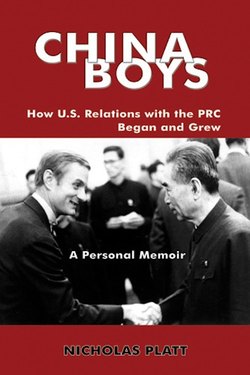Читать книгу CHINA BOYS: How U.S. Relations With the PRC Began and Grew. A Personal Memoir - Nicholas MD Platt - Страница 17
На сайте Литреса книга снята с продажи.
Back to School
ОглавлениеAt the start of the 1963 school year in February, some twenty students and their families from the State Department and the U.S. military made up the population of FSI Taichung. Last year ’s class, soon to graduate, welcomed us new kids (the Platts, Brookses, Sullivans, and Tim Manley). The “old boys” included Morton Abramowitz, Harry Thayer, and Don Anderson, who would later make big names in Asia and Washington. In a few months, they and their families would proceed to assignments in Hong Kong, Taipei, Singapore, and Malaysia.
The school was a two-story building, honeycombed with small classrooms, all of which had windows. The teachers were all Mainlanders with pure Beijing accents, led by a soft-spoken American linguist named Gerardus (Gerry) Kok, whose academic bloodline included Monterey and Yale.
The infants had grown up. The routine of six hours of class and four hours of homework remained the same, but instruction was now one-on-one, beyond intense. Live materials, newspapers, radio broadcasts, oral discussion, and debate replaced the pablum of elementary texts. Still shy, and fenced off as foreigners, we did our best to practice in the street and on the trips we took with teachers at the end of each term. These travels broadened our experience with Chinese, enriched our vocabulary, and placed us in some ridiculous situations.
Sheila’s letter home that April describes one inadvertent sojourn in a hot-spring brothel. There were seven of us, including Roger and Margie Sullivan and three Chinese tutors from the school. We had been driving for days over the mountains of northern Taiwan in a Chevrolet Apache van. Exhausted and hungry, we arrived in the town of Beitou just after dark.
Our travels that day brought us down out of the mountain to a hot-spring resort north of Taipei, where we discovered that all hotels are dual-purpose affairs, partly for travelers, but mostly for good time Charlies. Each had a staff of young ladies to assist the Charlies in having a good time. The gents picked an establishment called the “New Life Hotel,” and we were helped to our rooms by clouds of young ladies, one called “Goldie” in Chinese. The tutors thought the whole thing fairly amusing but not too far out of the ordinary. But we thought it a scream, especially when Goldie wanted to help N. & me take a bath. We managed to get rid of her, and had a lovely time wallowing around the hot spring water, from which we emerged much refreshed, but smelling strongly of sulfur. As we were going to bed, the door was practically broken down by young “misses” as they are called, who wanted, to use the local euphemism, to “rest a bit” with Nicky, who said no thank you. We were the only Americans in this establishment, so maybe we got special attention. Anyway, the giggles, door slamming, and other activities during the night were formidable, but we rather enjoyed, in a surrealistic way, the idea of sleeping in a brothel!
Our Chinese really benefited in the process. We are on really cozy terms with those particular tutors now––our first Chinese pals. They are humorous, jolly people and real artists at enjoying themselves. During the trip, each new bit of scenery, dish of food, or whatever, was greeted with sighs and cries of delight, Chinese style, and we have become quite good at being delighted ourselves.³
